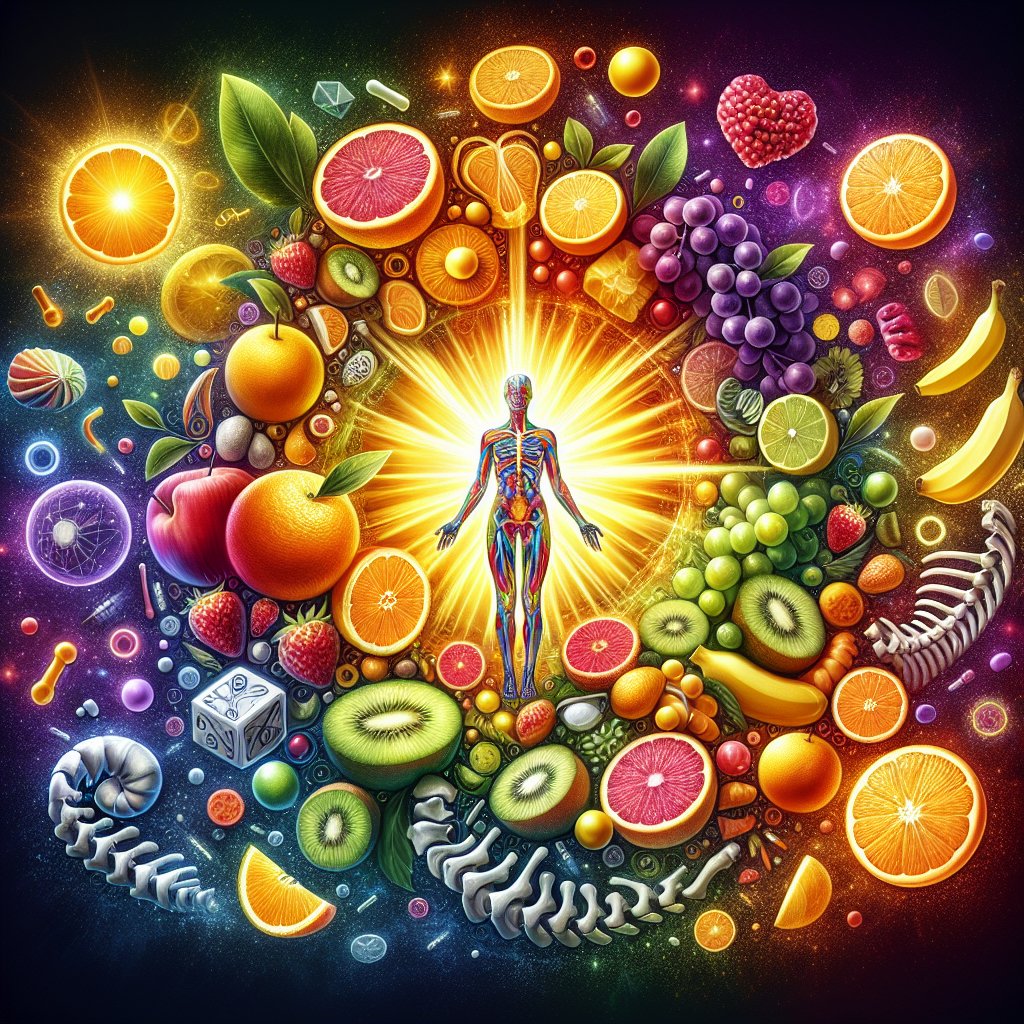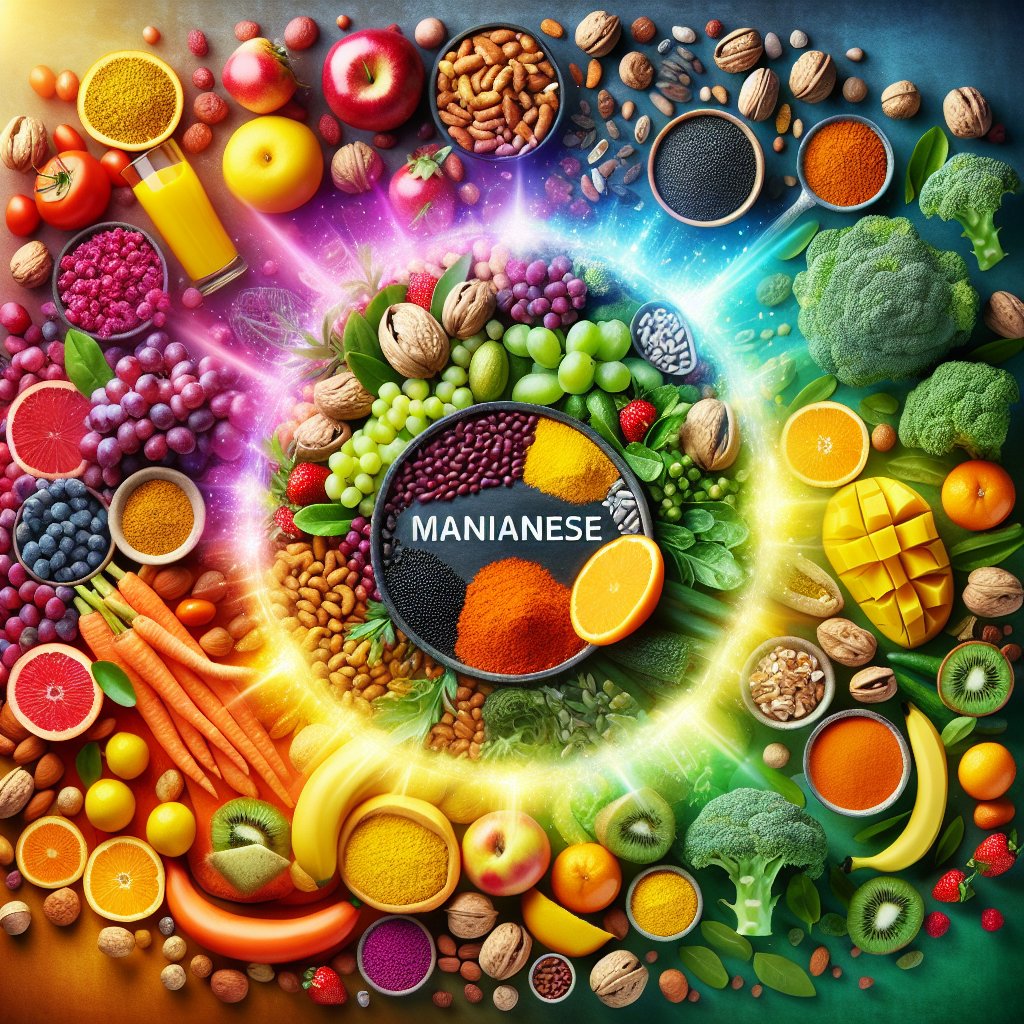Unlocking Vitality: Vitamin C, Vitamin D, and Manganese – Your Key to Optimal Health and Wellness!
Brief Overview of the Importance of Vitamins C, D, and Manganese
Welcome to our deep dive into the world of vitamins C, D, and manganese! These essential nutrients play a crucial role in maintaining overall health and well-being. Vitamin C, also known as ascorbic acid, is a powerful antioxidant that supports the immune system and helps the body absorb iron. Vitamin D, often referred to as the “sunshine vitamin,” is essential for strong bones, immune function, and mood regulation. Manganese is a trace mineral that supports bone health, metabolism, and antioxidant activity. Let’s explore the incredible benefits of these vital nutrients!

Explore the Benefits of Vitamin C
Vitamin C is a powerhouse nutrient with a plethora of benefits for your overall health and wellbeing. It plays a crucial role in supporting immune function, promoting collagen production, and offering potent antioxidant properties.
Scientific research has shown that vitamin C is essential for the growth and repair of tissues in all parts of your body. Additionally, it aids in the formation of collagen, a key protein that supports the structure of your skin, bones, and muscles.
Moreover, vitamin C is renowned for its antioxidant properties, helping to protect your cells from damage caused by free radicals. It also enhances the absorption of iron from plant-based foods and helps strengthen the body’s natural defenses against various illnesses.
Sources of Vitamin C
When it comes to boosting your intake of Vitamin C, nature has provided us with an incredible array of options. Citrus fruits like oranges, lemons, and grapefruits are well-known for their high Vitamin C content, but did you know that strawberries, raspberries, and blackberries are also rich in this vital nutrient? Additionally, vegetables such as bell peppers, broccoli, and spinach are excellent natural sources of Vitamin C. By regularly including these foods in your diet, you can ensure that your body receives an ample supply of this essential vitamin.
The Importance of Vitamin D: Building Strong Bones and Boosting Immunity
When it comes to overall well-being, Vitamin D is a true superstar. Not only does it play a crucial role in supporting bone health by aiding in the absorption of calcium, but it also contributes to a healthy immune system function. Research has shown that Vitamin D deficiency is linked to an increased susceptibility to infections and autoimmune diseases. It’s clear that maintaining optimal levels of Vitamin D is key to unlocking vitality and supporting our body’s innate ability to thrive.
Sources of Vitamin D
Vitamin D is essential for overall health and can be obtained from various sources. One of the best natural sources of vitamin D is sunlight exposure, as the skin produces it when exposed to UV rays. Additionally, consuming fortified foods like milk, orange juice, and cereals can provide a significant amount of vitamin D. For those who may struggle to get enough through natural sources, supplements can be a great way to ensure adequate intake of this vital nutrient.
Role of Manganese
Let’s talk about the vital role of manganese in your overall health. Manganese is not just an essential mineral; it’s a powerhouse when it comes to metabolism, bone formation, and antioxidant activity. Research has shown that manganese plays a key role in the metabolism of vitamin C, vitamin D, and various other nutrients, making it a critical component for maintaining optimal health and wellness.

Sources of Manganese
Let’s take a look at how you can easily incorporate manganese into your daily diet. This essential nutrient can be found in a variety of foods, making it accessible and easy to include in your meals. Nuts such as hazelnuts and pecans, whole grains like oats and brown rice, leafy vegetables including spinach and kale, and fruits like pineapple and raspberries are all excellent sources of manganese. By including these delicious and nutritious foods in your diet, you can ensure that you’re getting an adequate intake of manganese to support your overall health and vitality.
Synergistic Effects: How Vitamins C, D, and Manganese Work Together
It’s fascinating to understand how vitamins C, D, and manganese work synergistically in the body to support various physiological functions. Vitamin C is known for its antioxidant properties, supporting the immune system and collagen synthesis. Vitamin D plays a crucial role in calcium absorption and bone health. Manganese, on the other hand, supports metabolism and bone formation. Together, these nutrients create a powerful synergy, promoting overall health and vitality.
Recommended Intake Levels for Vitamin C, Vitamin D, and Manganese
Ensuring adequate intake of essential vitamins and minerals is crucial for overall health and vitality. Here are the recommended daily intake levels for different age groups:
Vitamin C:
– Children (1-3 years): 15 mg
– Children (4-8 years): 25 mg
– Males (9-13 years): 45 mg
– Females (9-13 years): 45 mg
– Males (14-18 years): 75 mg
– Females (14-18 years): 65 mg
– Males (19+ years): 90 mg
– Females (19+ years): 75 mg
Vitamin D:
– Infants (0-12 months): 400 IU (10 mcg)
– Children (1-18 years): 600 IU (15 mcg)
– Adults (19-70 years): 600 IU (15 mcg)
– Adults (71+ years): 800 IU (20 mcg)
Manganese:
– Children (1-3 years): 1.2 mg
– Children (4-8 years): 1.5 mg
– Males (9-13 years): 1.9 mg
– Females (9-13 years): 1.6 mg
– Males (14-18 years): 2.2 mg
– Females (14-18 years): 1.6 mg
– Males (19+ years): 2.3 mg
– Females (19+ years): 1.8 mg
It’s important to ensure you meet these recommended intake levels through a balanced diet or supplementation if necessary.
Deficiency Symptoms
Deficiencies in vitamins C, D, and manganese can manifest in various symptoms that affect overall health and vitality.
Vitamin C
Insufficient vitamin C intake may lead to scurvy, characterized by fatigue, swollen joints, and bruising due to weakened blood vessels. Additionally, slow wound healing and dry, rough skin are common signs of vitamin C deficiency.
Vitamin D
Vitamin D deficiency often results in weakened bones, muscle pain, and a higher susceptibility to infections. Furthermore, it can contribute to low moods and affect overall immune function.
Manganese
Deficiency in manganese can cause skeletal abnormalities, impaired growth, and reproductive issues. Symptoms may also include weak and brittle bones, as well as a compromised antioxidant defense system.
It’s vital to address these deficiencies promptly to prevent potential long-term health implications.
Conclusion
As we wrap up our discussion on the essential nutrients Vitamin C, Vitamin D, and Manganese, it’s clear that these play a pivotal role in our overall health and wellness. From boosting immunity, regulating mood, to supporting bone health, these nutrients are crucial for our vitality and energy.
Ensuring adequate intake of Vitamin C, Vitamin D, and Manganese through a balanced diet and supplementation, if necessary, is paramount. Research has shown that maintaining optimal levels of these nutrients can significantly contribute to our physical and mental well-being, making it essential to prioritize these nutrients in our daily lives to unlock our full potential and thrive.


